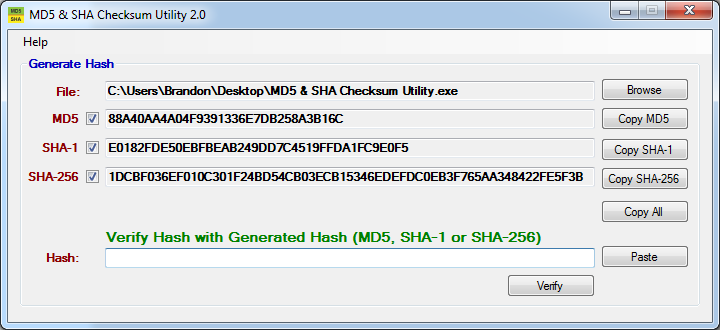

Here I am doing MD5 or SHA1 hashing only on the files with same size. As per my experience, first using fast hashing algo like CRC32 and then doing MD5 or SHA1 was even slower and didn't made any improvement as most of the files with same sizes were indeed duplicate so running hashing twice was more expensive from cpu time perspective, this approach may not be correct for all type of projects but it definitely true for image files.
#How to check file hash in windows 10 code#
The following is the code to find duplicate files from my personal project to sort pictures which also removes duplicates. Also, its reliability, while remaining lower than that of CRCs of the same length, is quite acceptable for messages over 4000 bytes. Alder32 is reputed for its simplicity and speed. In this context, Adler32, possibly applied in parallel for files chunks of say 5Mb remains a very valid answer. Furthermore the quest for speed may plausibly imply that one is dealing with "big" files rather than small ones. Never the less, in the question, the OP explicitly seeks a fast algorithm and waives concerns about security. For this reason the solution proposed should be avoided for files smaller than than a few kilobytes. Furthermore this multi-hash values setup may allow the calculation of the hash to be implemented in a multi-thread fashion.Ī word of caution if the files are small!Īdler32's "cryptographic" properties, or rather its weaknesses are well known particularly for short messages. of cases when the hashes are same yet the file content differ). For bigger files, you may calculate multiple hash values, for example one per block of 5 Mb of the file, hence decreasing the chances of errors (i.e. I am a believer in giving people what they need, which is not always never what they think they need, or what the want.įor this type of application, Adler32 is probably the fastest algorithm, with a reasonable level of security. Once there is a match, the only way to determine if they are the same is to compare the whole files. Cataloging all existing files into a DB should be fairly quick, and looking up a candidate file against this DB should also be very quick.
#How to check file hash in windows 10 64 Bit#
A hash is never unique, but a hash with a number of say 9 digits (32 bits) would be good for about 4 billion combination, and a 64 bit number would be good enough to distinguish between some 16 * 10^18 Quintillion different files.Ī decent compromise would be to generate 2 32-bit hashes for each file, one for first 8k, another for 1MB+8k, slap them together as a single 64 bit number. but something that will happen frequently, then one should store hashes for each file.

If it is for 2 large sets of files, or many sets of files, and it is not a one-time exercise. Then compare size, and after that simply compare the files, byte by byte (or mb by mb) if that's better for your IO. Is it for one-time comparison of 2 arbitrary files? Unfortunately we do not know enough about the task at hand to know what the optimal solution should be. What we are optimizing here is time spent on a task. Latest hotness seems to be and and xxhash also has a slightly updated version as well.

I did not research to see what the collision properties of these are. Apparently FNV1A_Jesteress is the fastest for "long" strings, some others possibly for small strings. If you "just want the fastest raw speed" and don't care as much about quality of random distribution of the hash output (for instance, with small sets, or where speed is paramount), there are some fast algorithms mentioned here: (these "not quite random" distribution type algorithms are, in some cases, "good enough" and very fast). Don't know if CRC32c is as good of a hash (in terms of collisions) as xxHash or not. is also said to be quite fast (and leverages hardware CRC instructions where present, which are probably very fast, but if you don't have hardware that supports them, aren't as fast). There is a 64 bit variant that runs "even faster" on 64 bit processors than the 32, overall, though slower on 32-bit processors (go figure). Xxhash purports itself as quite fast and strong, collision-wise:


 0 kommentar(er)
0 kommentar(er)
